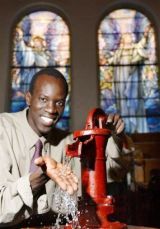‘Lost Boy’ set to finish mission in southern Sudan
By BEN DOBBIN, Associated Press Writer
ROCHESTER, N.Y., Dec 24, 2004 (AP) — At a Christmas fund-raiser, Salva Dut brought along a small water pump to illustrate his mission of helping isolated villages in southern Sudan tap into an underground treasure: running water.

|
|
Salva Dut shows a water pump he uses for demonstrations for his mission to bring clean water to villages in Sudan at the Downtown United Presbyterian Church where he works as a clerk in Rochester, N.Y., Tuesday, Dec. 21, 2004. (AP). |
One of the thousands of “Lost Boys of Sudan” who spent over a decade fleeing war and famine before landing in America, Dut began visiting churches and colleges across New York last year to tell his remarkable tale of survival – and his dream of drilling wells in his ravaged homeland.
Donations to his charity, Water for Sudan Inc., trickled in for 18 months, topping $40,000, but began to swell in late September as word spread around the country.
John Wood, a retired doctor in McCormick, S.C., took his son’s advice and recently mailed $200 in lieu of Christmas presents. Dolores Quigley, a soup kitchen volunteer in Winneconne, Wis., sent $40, remarking in a letter that “everyone should have drinking water.”
Then came a $20,000 check from Kristin and Robert Jones of Chesapeake, Va., in honor of her father, Dr. Walter Hoffman, a civic leader in Memphis who died in November. “We believe that he would have admired your plan to dig wells,” the couple wrote.
Dut, 30, knew right away it was time to prepare for the trip home to the Dinka village of Lou-Ariik he last saw 19 years ago. At age 11, he fled from his school into the bush as his district town came under assault from government troops.
With $94,000 in hand – his target remains $200,000 – Dut will bid farewell to fellow parishioners at St. Paul’s Episcopal Church on Jan. 9, then board a plane to Africa. He expects the first 15 of 32 wells, one for each village in his home province of Tonj, will be built before the dry season ends in May.
“This thing is really happening,” Dut marveled. “I really get overwhelmed that I am going to do it.”
Officials in southern Sudan have welcomed Dut’s help. Wells could provide stability for the nomadic Dinka, who migrate with their animals during the dry season in a desperate search for water – and often end up drinking from fetid pools. A United Nations report in 2001 found that 36 percent of hospital patients in Sudan were found to be infected with waterborne parasites.
While the mainly Christian and animist region is now relatively calm, advanced peace talks between the rebel Sudan People’s Liberation Army and the northern-based Islamic government stalled this year as war and pillaging intensified in the western province of Darfur.
During the 21-year-old civil war in Texas-sized southern Sudan, more than 4 million people were displaced, 2 million died and at least 17,000 children, many of them orphans, were driven into exile. Most ended up years later in a sprawling refugee camp in Uganda, and about 3,800 were resettled in the United States.
Dut arrived at a church-sponsored oasis in Rochester in 1996, then learned in 2000 that his father, Mawien, was alive. He had showed up seriously ill at a U.N. hospital deep in a Sudanese jungle, his stomach riddled with worms from drinking contaminated water.
Dut traveled to meet his father, who was recovering from surgery, but the war prevented him from returning to his village to see his mother. On his return here, he realized a well-drilling project would be the best way to help his remote village and others like it in one of the poorest places on earth.
“I hope everything will go well there, the way we want it to happen,” Dut told colleagues at a fund-raiser Tuesday.
